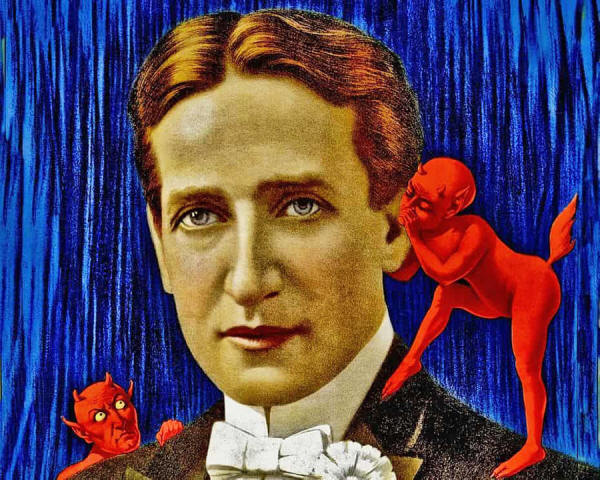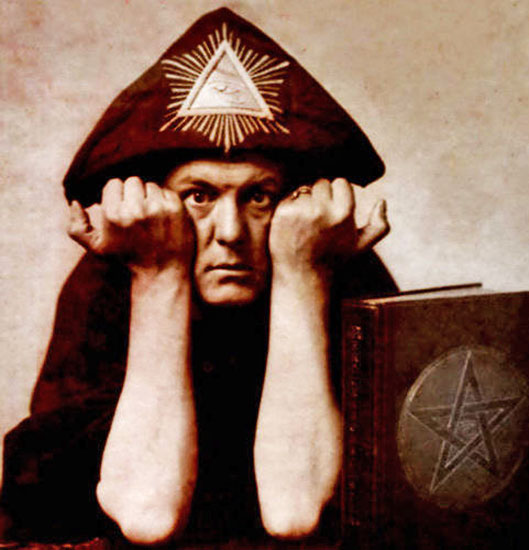|
original and important thinkers of this era - right up there with such titans as Einstein and Joyce.
Indeed, what Einstein did for physics and Joyce for the novel Crowley did for the mystic tradition.
He swept aside all 19th Century barnacles and incrustations, redefined every concept, and created something that is totally contemporary.
Robert Anton
Wilson
His life was filled with strange behavior that
inspired all kinds of rumors and myths, and in fact, everything
about him at a superficial glance gives you a deeply sinister
feeling.
The tabloids described him as the "The Wickedest Man in The World" because he, and his followers, experimented with drugs, sex and alternative states of consciousness in an attempt to develop greater self-understanding.
Yet once you read through
his books and life story, you
realize his actual depth and breadth of work.
Today, I'll go into his shocking and scandalous life, and the 4 greatest, and most surprising lessons we can learn from him.
Aleister Crowley
Crowley was influenced extensively by different spiritual teachings (he studied philosophy at Cambridge), and was extremely well read in the works of,
He was also an avid
practitioner and teacher of Raja Yoga (Royal Yoga).
He named this body of
work the "Thelema"
(from the Greek word for "Will").
Ultimately though, he
described them both as leading to the same destination:
This way of seeing the world, of joining opposites, was the reason he adopted the controversial Baphomet deity (goats head with a pentagram on his forehead) into his practices.
But this wasn't as a Satanic idol (he didn't believe in a biblical God or Devil), but rather as an alchemist symbol for the union of opposites.
Do what thou wilt shall be the whole of the Law. Love is the law, love under will.
The basis of all
Crowley's ideas can be reduced to the above two maxims which he
referred to as "The
Law of Thelema".
This to him didn't mean "do whatever you want" but rather, dedicate your life to finding out what is truly and deeply you, in essence, find your natural and divine higher self.
Crowley called this
higher self, his 'Holy Guardian Angel', that later became an
entity known as 'Aiwass'.
Krishna's Atman (the true self), Buddha's Anatta (no-self), Mohammad's Allah all point in a similar direction:
The idea seems simple, but most people are very disconnected from their true natural self, many aren't even aware of such an existence.
In Crowley's eyes (following closely the Taoist idea of "do what comes naturally"), we all have our path in life that is,
Anyone who is sent off
this path by not understanding themselves (e.g. by creating beliefs
of how they should be) or external influences (doctrines, social
values, etc.), is allowing their Conscious Will to conflict
with their True Will.
He was brought up by strict religious parents (his father was a preacher and his mother a devout 'fanatic') and he delighted so much in disturbing others (something he continued as an adult) that his mother nicknamed him "The Beast".
He enjoyed such a name so much that after reading the Book of Revelation he added "666" to his nickname that later gained him infamy. One of the reasons he did so was that in Qabalistic gematria (or number mysticism) the number is associated with the Sun.
And when they asked him in court why he had self-designated that name for himself he explained:
He joyously identified with this nickname because it opposed the spiritual, intellectual, emotional, and sexual restrictions that he believed enslaved the human soul and prevented our "True Will" to make itself present.
It's through this desire for self-exploration of the True Will that he, and his followers, used drugs in their spiritual school (Abbey of Thelema) that resulted in further scandals.
His reputation as a
Heroin addict was true, though this was prescribed to him
legally to treat his asthma before medicine knew of its additive
nature.
Crowley illustrated this in the following way:
Once you find your True
Will, your
path with heart, or that which
fills you with aliveness and joy, follow it with deep conviction and
don't let anyone or anything prevent you from it.
This is a wise buffer to add as this law can easily be taken out of context, and can return it again to the misguided attitude of:
This second part is not an anti-authoritarian idea but something of much deeper meaning.
Thousands of years of religious conditioning and the societal virtue of 'self-sacrifice' has weakened us, creating self-rejection and a high susceptibility to authoritarian power.
Crowley's attitude steers
away from puritanical models of personal debasement and
self-reduction, and instead employs a robust self-inclusive
celebration of our true nature, encouraging us to embrace our
sexuality, self-esteem, passion, and personal empowerment.
He believed there was no need to hate or debase ourselves, or to psychotically crucify ourselves as 'sinners' in order to be aligned with our true natures.
Crowley felt that the binding force behind the universe is love.
Not a superficial libido
focused love, or a mental love rooted in attachments, fears and
sentimentality; but a love that is guided, that arises from our True
Will, from our deepest inner guide.
This is not a love that is characterized by your typical love and hate dichotomies - "Love under Will" is an all-encompassing love, a love that arises from truth, from a transcendence of our "False Will" beyond our ego's.
This type of love is what some define as 'Oneness'.
Sexual Yoga's, like the Tantra, are all based on the idea that through sexual union comes knowledge.
The bible itself uses the
word 'know' as synonymously as it does with the word 'sex'. So in
essence, it is thought that the act of sex opens the possibility of
truly getting to know someone, to see their True Will.
That is where Crowley's
conceptual teaching of "Sex
Magick" comes in.
That climatic moment
becomes an experience where we go beyond our thoughts, experiencing
immense inner silence. This is also known as the Zen state of
'no-mind', of a calm present awareness.
Aleister Crowley for the
many reasons listed above and more, still remains a controversial
figure, who, because of his reputation, has had much of his
genuinely interesting approach to spirituality unnoticed or
misunderstood.
|



